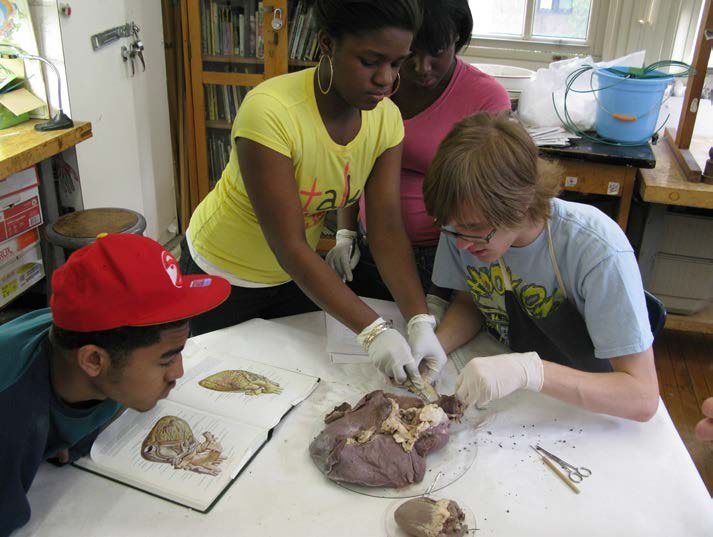Science & Engineering in Consortium Schools
To most students new to the Consortium, science learning is synonymous with memorization: long lists of biological and environmental structures and functions, chemical symbols of elements and molecules, abstract algebraic physical formulas.
Too often they have misconceived ideas of the nature of science and what scientists do. Typically scientists are men, invariably white, dressed in white gowns who carry out “weird” experiments behind closed doors—the stereotyped image of the “‘mad” scientist. For most of these students science is a mystery much too complicated for them to solve.
Science teachers in the Consortium know that science is best learned by doing. Consequently, the long-term goal of any inquiry science or engineering class is to enable students to design their own experiments or engineering designs. This problem-based approach to teaching science is a well-established and research-based strategy for developing students' knowledge and skills in the sciences.
This process culminates with the graduation-level PBAT in Science, through which students develop, implement, and analyze an extended controlled experiment or create, prototype & iterate an original engineering design. Students’ written work and oral defenses are evaluated by their teachers and external evaluators using the Consortium’s Experimental Science or Engineering/Design rubrics.
“I had to do a neuroscience PBAT…and it like made me feel like an actual scientist. That one was pretty exciting because I got to try new technology and just kind of play around with science in a new way.”
- Consortium Grad and CUNY Student
Resources for Teachers
Guidelines for Instruction & Assessment
Experimental Science Rubric Guide — A guide for teachers and evaluators for the revised science rubric shared in June 2024.
Science Instruction & Interim Assessments in Consortium Schools Interim Assessments, implemented in each science class a student takes, provide the practice and discipline our students need to reach the level of high competency described by the Experimental Science and Engineering/Design rubrics.
Pedagogic strategies must focus on one major concern: How do we as teachers create an atmosphere of inquiry in which students will be encouraged to think like scientists, to see themselves not only as members of a class but as an integral part of a community of scientists?
How can our teaching practices encourage students to internalize the scientific process? How do we demystify science for our students?
Shared Science Curriculum & Planning Resources:
Introducing Scientific Research Articles to Students — Created by Barry Fox, Consortium. A set of classroom activities that introduce students to research designs and prepare them for reading scientific literature.
Neuroscience Curriculum & PBAT Resources – Created by Teachers from the Institute for Collaborative Education. A comprehensive set of resources for teaching neuroscience and supporting students throughout the PBAT process.
Genetics Curriculum Resources - Compiled by a teacher committee in Summer 2020, this document includes resources for in person, hybrid, and fully online teaching of Genetics. Additional recommended classroom texts in Genetics have been compiled by Barry Fox
Water Quality Unit Resources — Compiled by a teacher committee in Spring 2018.
Teaching the Climate Crisis - Sample Syllabi. Recommended classroom texts & resources for Climate Change compiled by Barry Fox
Nuclear Chemistry - Created by Rayhan Ahmed, Gotham Professional Arts Academy
Recommended texts for classroom use in Physics
Recommended texts for classroom use in Animal Behavior
Recommended texts for classroom use in Genetics
Recommended texts for classroom use in Evolution
Learn more about Science teaching in Consortium schools
Read Inquiry Teaching in the Sciences (A Teacher-to-Teacher Publication)
This book provides an overview of inquiry-based science projects. It features a detailed case study of an inquiry-based semester-long course in animal behavior, including classroom activities. Contact info@performanceassessment.org to order copies.
Watch Talk, Talk, Talk



